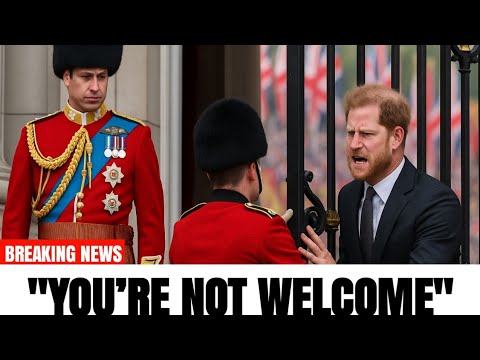The ULTIMATE BETRAYAL! Prince William SLAMS the Door on Harry at Trooping 2025

He thought he could walk back into the spotlight, but Prince William just slammed the palace gates shut on his brother. In a stunning royal power move, Prince William has secretly written to King Charles, urging him to block Prince Harry from appearing at Trooping the Colour 2025. Sources say the letter wasn’t just persuasive; it was damning, invoking Harry’s past scandals and warning of a national backlash. And King Charles, he folded. What followed was an explosive reaction from Harry, a private confrontation, and a cold final reply. The matter is closed. But what exactly did he say? Why now? And how did Harry respond behind closed doors? Stay tuned because this isn’t just a royal snub—it’s a calculated takedown.
Before we continue, please hit the like button, subscribe to the channel, and turn on the notification bell for updates. The summer air over London was thick with anticipation.
Streets had been scrubbed clean. Union jacks fluttered from every lamp post. And soldiers in gleaming uniforms stood shoulder-to-shoulder, rehearsing precision. This was Trooping the Colour, the grand military celebration of the sovereign’s official birthday, steeped in centuries of tradition. But this year, 2025, wasn’t just another ceremonial parade. Behind the polished brass and carefully choreographed salutes, an invisible storm brooded—one not of weather, but of legacy, betrayal, and the quiet war that continues to divide Britain’s most famous family.
Prince Harry was missing from the royal balcony. That alone would have sent ripples across the British press. But this wasn’t a case of scheduling conflicts or personal discretion. This was different. This was intentional—and not just any exclusion. It was a strategic blow executed with the precision of a master tactician who knew when to make a move and when to strike. That tactician, none other than Prince William, heir to the throne—and now, unmistakably, the man pulling strings behind the palace gates.
For the first time in public memory, whispers turned to statements. Royal watchers noted the tension. Journalists had been briefed not to expect Harry. Yet, the deeper story was hidden in plain sight—buried beneath rehearsed smiles and wave formations. What had really happened behind closed doors? Why had Prince Harry, the king’s son, been blocked from appearing alongside his family on one of the most televised royal events of the year? And who was truly responsible?
According to palace insiders and sources close to the royal household, this wasn’t a last-minute decision. It was premeditated, carefully crafted—a move so deliberate it’s being described as Prince William’s ultimate chess move. It began not with a confrontation but with a letter—a private correspondence written not out of emotion but out of calculation. In it, Prince William is said to have laid out his case with surgical clarity. If Prince Harry were allowed on that balcony, it would damage the image of the monarchy irreparably.
He referenced past betrayals, invoked the wounds still unhealed from Harry’s explosive memoir and media blitz, and warned of the public backlash that would inevitably follow. The letter didn’t plead; it warned: “King Charles, caught in a crossfire between fatherly instinct and royal responsibility, had a decision to make.” But William had done his homework. His message was backed by facts, bolstered by strategy, and padded with the collective whisperings of courtiers who had grown tired of the Sussex drama.
The monarch, who had spent decades defending the institution’s image from scandal and intrusion, knew that allowing Harry to appear would once again plunge the family into headlines—not of tradition and pageantry, but of controversy and division. And so, a decision was made quietly, definitively.
Prince Harry, though informed of the event—as any royal would be—was not invited to participate in any official capacity. No formal appearance, no place on the balcony, no salute beside his brother. When the news reached him, the reaction was anything but royal.
According to multiple sources familiar with the situation, Harry was blindsided—infuriated. He believed he still had a place, however limited, within the ceremonial realm of his heritage. That belief was shattered in a single phrase delivered to him by a senior aide: “The matter is closed.” Harry, reportedly fuming, made direct appeals to King Charles. He demanded a conversation. He wanted to present his side to clarify that he had flown to London in good faith, but his calls went unanswered for hours. And when they were finally returned, the response was not a dialogue—it was a decree.
The king, after consultation, informed his son that the decision had been made at the highest levels. There would be no reversal. The public face of the monarchy could not afford another rupture. The optics, the advisers warned, would be catastrophic. And so, the younger son of the king found himself on the outside once again.




